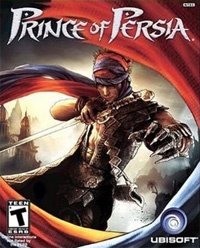 Review by Matt “Steerpike” Sakey
Review by Matt “Steerpike” Sakey
Prince of Persia: Epilogue
Developer Ubisoft Montreal
Publisher Ubisoft Montreal
Released March 5, 2009
Available for Windows XP/Vista, Xbox 360 (version reviewed), PS3
“Employing to great effect its considerable talent for destroying everything it touches, the team at Ubisoft Montreal has produced in Prince of Persia: Epilogue an even more obnoxious play experience, packed even fuller with infuriating Quick Time Events, gorged even further on unresponsive controls, offering even greater opportunities for frustration and disappointment. It’s too bad there’s a mildly interesting character-driven drama in here, because we have to endure more than is fair to get at some exposition that is – at best – adolescent.”
This is not a full review of PoP:Epilogue. I haven’t finished it and I don’t know what happens at the end. I’ve scored it, because it deserves a score – or, rather, I deserve the right to give it a score after enduring it these long hours – and I am pretty close to the end. If something substantive changes once I do finish I’ll let you fine readers know, but don’t get your hopes up.
Why We are Here
I was not what you’d call a huge fan of Ubi’s latest royal Arabian outing. I thought Prince of Persia an unworthy addition to a storied franchise, a game lacking the flair and style that made its predecessors, even the mediocre ones, so memorable. So why am I reviewing Epilogue, the downloadable wrap-up to the game, which was quietly released on March 5?
Well, it’s not out of a sense of journalistic responsibility, I promise you that. Epilogue has all the problems of PoP and adds some new ones, and I was in no hurry to revisit a game I feel completely failed in its own potential just to say that I’d dutifully covered every inch of Prince of Persia territory. No sir (and ma’am), I did it because I had to.
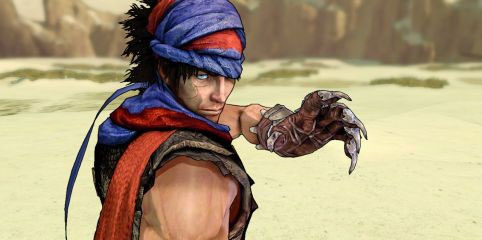
How could anyone resist this face?
You see, Prince of Persia has what you might call a surprise ending; one that’s shocking enough, and closes on enough of a cliffhanger, that anyone who plays games even partly for their stories is pretty much without a choice in the matter of buying this final chapter. And since Epilogue is for all intents and purposes the same game as PoP, and since I already reviewed PoP at length, I can talk about that story and the characters, which were the parts that interested me enough to keep me going through the first one.
Just a heads up: I’m not even gonna try and be sensitive with spoilery stuff. There’s no way to talk about Epilogue without discussing in detail what happened at the end of Prince of Persia. Only people who’d played through to the end of that game would be interested in what happens next, so if you’re still waiting to be surprised, read no further.
But seriously, get on with it. The game’s not that good. Wrap it up already.
Don’t You Die on Me! Crap, She’s Dead
Quick review: PoP dealt with two unlikely heroes’ efforts to cleanse the land and shove the dark god Ahriman back into his bottle after a high-profile escape attempt.
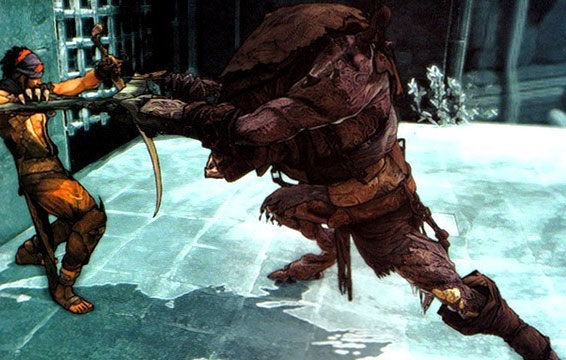
Okay. Clearly you're upset about something. Let's talk it over.
Elika is princess of a strange and faraway desert kingdom. Her people, the Ahura (pronounced Ooo-rah, like Army people say to each other), are charged with watching over Ahriman’s prison. Collectively they worship Ormazd, the god of light, who locked his divine-though-evil brother up in a temple in the first place but hasn’t been around recently. With Ormazd’s absence and the fact that more than a thousand years have passed since Ahriman caused any trouble, the Ahura are dwindling… down to, like, six. Their kindgom is lonely and remote and there’s nothing to do there but sit around and wait for a god who’s never going to escape to escape. Elika is one of the very few to stay at her post, tending to an increasingly despondent widower father and doing all she can to keep the Ahura alive. (Except that. Apparently just repopulating never occurred to her).
When Elika is killed in a fall, though, her father – unable to face the thought of losing another loved one – does something really monumentally stupid: he makes a bargain with Ahriman, and agrees to free the god in exchange for Elika’s life.
This does not sit well with his revivified daughter, who promptly takes off on a quest to lock Ahriman back up again. That does not sit well with Ahriman, who’d after all just gotten free and restored her life so he doesn’t think she’s showing much gratitude. None of it sits well with Elika’s dad, who goes totally off the deep end and is really annoying through the rest of the game.
Early on in her quest, Elika hooks up with the Prince – a nameless acrobatic rogue lost in the desert, looking for his missing donkey. What began as a chivalrous attempt to protect a lady from something he thought was an unprovoked attack turned into a life or death struggle with the emerging god, as Elika and the Prince try to eliminate the taint of Ahriman’s Corruption from the land before it can cover the whole world in oozy pudding.
Elika, somewhat out of the blue, gets filled up with cool magical powers during this. It seems the god Ormazd wasn’t quite as laissez-faire as everyone had thought, and in lieu of helping directly, he gives her the power to defeat Ahriman. Having purged the fertile territories of the Corruption, the duo returned to the temple and managed, after a horrific battle, to once again trap the evil god. But it came at a price; the powers Ormazd had given Elika were clearly killing her long before the final confrontation, and the effort involved with sending Ahriman back to jail was too much. The final burst of magic to restore the sacred trees that sealed Ahriman away cost Elika her life, leaving the Prince alone with his sorrow.
Game over.
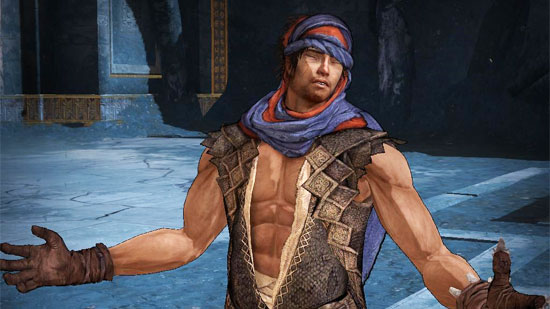
Awww, man... I play through the whole stinking game and she dies? That just blows. Maybe I can get a job in the next Pirates of the Caribbean game.
Not Exactly
The fact that she died isn’t the surprise ending. Narratology 101 states that great victory cannot be achieved without great sacrifice. And there was always something very tragic about Elika, a sadness that permeated the character. I sensed she was doomed the moment I first laid eyes on her, and I doubt I’m alone in that.
I’m curious how many people hit the reset button once the credits started rolling, because the true end of Prince of Persia doesn’t come until after they stop. More impressively, that end is totally up to you; the right thing to do, obviously, is to hit that reset button, to let Elika die and recognize that her life, weighed against all those who would suffer should Ahriman be freed, is a small price to pay. Elika certainly recognized this and didn’t find the decision difficult. You could shut the game off and be done with it, maybe pop in Fable 2 or watch some Netflix, content in the knowledge that you’d saved the world…
…But knowing also that there was a way to bring Elika back. Ahriman had already made it clear that he’d resurrect someone in exchange for his freedom; the dilemma becomes one of scale. And it is up to you. The world of the game is wide open to you after the credits; you can just wander, or shut the thing off, or you can take your sword and chop down those trees that Elika so recently died to restore, and in so doing seal an unspoken promise with a god of darkness.
The actual ending of Prince of Persia is great cinema. When the last tree comes down you run back to the stone dais on which her corpse lies, waiting to see the sparkle come back into her eyes, color to her skin, waiting maybe for that desperate inhalation that we kind of expect when dead people come back to life. But instead she does it silently, undramatically, sitting bolt upright, eyes wide and staring, and asks a one-word question – “Why?” – in a shocked and hopeless tone, defeated and disbelieving. And as the Prince scoops her up and carries her out of the valley, a curious blankness in his eyes and unreadable expression on his face, as ropes of darkness coil out from cracks in the earth behind him and the temple collapses and from the fissure howls the dark god’s scream of triumph, and you realize that you’ve ruined all the effort that you put in over the last twenty hours, that you’ve undone everything Elika gave her life for in the first place, well, that’s almost worth the price of admission.
Of course then the game ends, you receive the “To Be Continued” accomplishment, and you’re stuck wondering what happens next and why you did what you did in the first place. Why, why bring her back when the price is so unimaginable? The Prince is not sure himself why he did it, though he produces a couple of feeble of excuses when questioned about it later.
I prefer to think it wasn’t something shallow and stereotypically videogame-y like “he loved her.” The Prince doesn’t love Elika, and she certainly doesn’t love him. There’s a little sexual tension early on in Prince of Persia, and he never stops leering (because, let’s be honest, she’s hot, and limber), but as their time together progressed I at least got the sense that they’d moved beyond perceiving each other as potential romantic grist and were simply people who cared about and depended on each other, like between the two of them they made a single effective person. His expressionlessness as he carried her out of that valley spoke the answer to me. Knowing what it would mean, the Prince saved Elika anyway because he, always a loner, had suddenly found himself in a place where he couldn’t imagine his own existence without her by his side, even if that meant precipitating armageddon. But I never felt there was anything romantic about their relationship. However, I have my doubts about Ubi writers possessing the deftness and sensitivity to craft a male/female interaction this complex – essentially a friendship so intimate it moves beyond the standard trappings of intimacy – which means that if I ever do get to the end I imagine there’ll be protestations of love and face sucking.
As Epilogue opens they’ve sought shelter in a nearby tomb and Elika is so deranged with fury that at first she can’t speak even to yell at the Prince. Their roles have reversed; where in the previous game she was the dauntless sorceress committed to imprisoning Ahriman, now it’s the Prince who drives them forward, convinced that somewhere in what turns out to be a vast subterranean complex there might be some way to seal the dark god away again. Elika, meanwhile, still retains her magic, but has lost all hope of victory, possibly because she’s already been dead twice in one 24-hour period, and that would demoralize anybody.
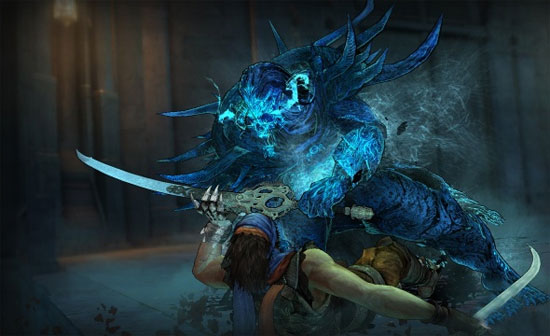
Okay, clearly you're upset about something. Let's- wait, how many times is this gonna happen?
What can I Say, He Sees the Silver Lining
Nolan North and Kari Wahlgren – the former having appeared in like 98% of all videogames in history, but is best known as Nathan Drake from Uncharted; the latter a big name in the anime English dubbing scene – return to play the Prince and Elika in Epilogue, but I found myself rather disappointed with them here. This script lacks some of the snap the previous had, and neither actor seems as committed to nailing their lines. North and Wahlgren both stumbled plenty in Prince as well, something I put down to bad direction since they’re both good voice actors; here they really seemed to be phoning it in a lot of the time.
Much of their repartee stemmed from a script that got unfairly bad press; sure, not all of it worked, but a fair amount did, and it was designed to make the characters seem like three dimensional humans. I still chuckle when I think of the time the Prince is questioning Elika on her social history – “No boyfriend? No fiancee?”
“There aren’t many to choose from out here.”
“So that means you’ve never-“
“I’m very well-read,” Elika replies primly, which makes the Prince laugh.
You get less of that in Epilogue, and the dialogue mechanism is still limited to the left trigger, so it acts as a break in the action when you want to converse. If you’re going to break the action you may as well use a cutscene; these dawdling exchanges just made me antsy. I hope they figure out a way to have these conversations on the fly, during movement, in a future game.
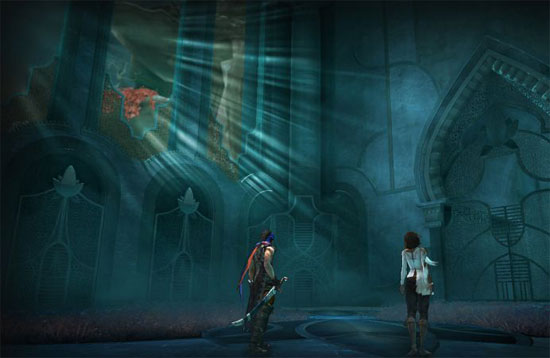
It should have been called Prince of Persia: the Sulking.
Also, the caricature portions of their characterizations are dialed up. Elika has become such a negative nelly that she’s no fun to hang around with any more; it’s all “we’re doomed” this and “Ahriman will kill us eventually” that. She was a little bitchy before but now she just veers between gloomy and mean. It’s against the nature of a character like the Prince to be the one holding the group together, and his relentless optimism in the face of what really does seem like pretty overwhelming odds is kind of baffling. He is supportive and gentle, understanding her despondency, but what we don’t see from him is what was really necessary to make the character-driven portion of this epilogue work: a fierce response to her accusations that he’s a fool for reviving her; anger directed not at Ahriman, but at her, anger that she could fail to see what is so obvious to him – namely that her life is worth more than everyone else’s, so her sacrifice wasn’t a fair trade. Since he’d be unable to admit this fact to himself, her constant hammering on the subject should have elicited an angry response, not the measured, defensive logic he employs.
Anyway, the Prince’s conviction that they can beat Ahriman eventually leads the god to start targeting him, first with tempting if soul-damning treats and later with increasingly violent attacks. His committment to Elika and their cause leads him, obviously, to turn down the promises of riches and hot girls and silk pillows, which surprises Elika… surprise that is hurtful to him and ignorant on her part. The Prince has, after all, had myriad opportunities to leave her but has insisted on remaining as a supporter and protector throughout two games. Basically their relationship remains intact in Epilogue, but it’s not as well-executed as I’d hoped.
Yes, But
Now forget all that, because the character stuff makes this seem like a moderately intriguing use for your 800 Microsoft Points, but to get at it you’ve got to suffer through a whole lot of insult and pain.
Prince of Persia took the glorious, fluid, instinctively ballet-like motion and combat of the previous trilogy and replaced it with unresponsive controls, split-second Quick Time Events, hamhanded set-piece combat, careless and inept puzzle mechanics, an evil camera fueled by the burning souls of a thousand murdered puppies that you could only move when you didn’t need to but never when you did, and imbecilic design focused more on showing off animations than on making the game playable or fun. Epilogue takes this approach and multiplies it by a billion, making this five-or-so hour chapter into a crime against gaming. The fact is, I wanted to play Epilogue, I wanted to see the story; but its mechanics are so poorly made and so frustrating that I simply had to stop every now and then to keep my temper. And then it was difficult to return, knowing that I’d be joining the game at some maddening sticking point. That’s why it’s taken me so long to get this review published, and why I finally decided to do so without finishing.
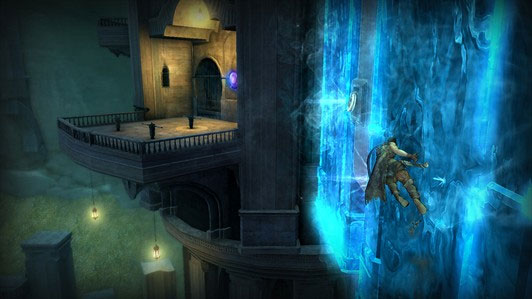
And when running on regular walls gets dull, there are invisible magic ones to run on.
Still with us is a camera system that you can’t control while in combat, locking you to whatever useless angle the game decides will be most inconvenient. Still with us are combat instances where every fight is with one of the same repeated boss creatures, most of whom suffer negligible damage from attacks for no evident reason, meaning that what should be a fairly routine encounter can take 30 minutes to complete. Still with us are controls that ignore you nine times out of ten on occasions when you need them to work. Still with us is Elika’s ability to instantly save the Prince from any lethal damage, so there’s no particular reason to exercise care in your actions.
What’s new? Uhm… they added some animations, mostly in the Prince-getting-knocked-down genre. Oh yes, and they took the complaints about the simplicity of Prince’s environmental puzzles to mean that they should include puzzles where you simply can’t see where you’re supposed to go. And that’s about it. No, wait! They also made some of the already obnoxious combat encounters extra super obnoxious by throwing in monsters that transform into other monsters, flipping back and forth between iterations in the middle of fights. That’s it.
What they didn’t do is take out any of the bad stuff or include many new encounters (pretty much everything you fight came straight out of the original Prince, and even that game had only five different monsters that you fought over and over again). Nor did they do any polish or tighten the controls. So basically what you’ve got in Epilogue is the same game, tweaked to be somewhat more annoying.
And it’s not fun to play. That’s pretty much the kiss of death for a game, even a good one.
Let’s Go Someplace Flat
Released on March 5 with almost no fanfare (I’d have missed Epilogue if it weren’t on my calendar), it’s pretty clear that Ubi wanted to wrap things up and move on to its next atrocity without spending too much time on this little bit of DLC. A quiet release at a low price point, followed by a quiet burial in the sand, suggests Ubi knows it has mishandled the Prince of Persia franchise and is (let’s hope) focusing on getting it right next time.
As for me, I’ll keep grinding away, if only because I’m curious about how the game ends. But as epilogues go, this is one they may have done better to leave as a shock ending.
Minimum System Requirements for PC
Windows XP/Vista; dual-core processor 2.6GHz+; 1GB RAM; 256MB DX9 video (DX10 supported)


I don’t have a thing to add to this review other than to say but for fickle fate, there go I with another crappy game. Better you ‘pike, than I. Oh yes…better you.
Oh and I love the new “roadkill” pic.
I agree with you on a lot of points about Prince of Persia, including your analysis of the wonderful ending. However:
“But I never felt there was anything romantic about their relationship. However, I have my doubts about Ubi writers possessing the deftness and sensitivity to craft a male/female interaction this complex – essentially a friendship so intimate it moves beyond the standard trappings of intimacy – which means that if I ever do get to the end I imagine there’ll be protestations of love and face sucking.”
I do disagree with you there because that is exactly the kind of relationship the Ubi writers crafted in Prince of Persia. I’m not talking about the Epilogue, which I did play through, and it didn’t add to the narrative in any meaningful way. However, the full game itself established exactly this kind of relationship between the two. However, if writers of any potential sequels try to change that relationship to a romantic one…. well, good luck to them. They might or might not do a good job. However, I really feel that the writers of this 2008 version of PoP did an amazing job writing just this sort of connection between the two.
You make a good point, Fraz. I said that because I sort of assumed that only I saw things that way… i.e., that I’d interpreted a kind of relationship the writers had not intended. If this is what they did intend, then I take it back.
I was never clear on why so many reviews blasted the script and lead performances in the 2008 PoP. I found both perfectly adequate, and in some cases simply inspired. It’s rare that you see a relationship between a male and female done this way. I hope I’m wrong and Ubi’s writers are blazing a new trail.
Welcome to the site!
I agree that Ubi should have left well enough alone. Big studios, be they in the business of film or games, are terrified of open endings, and they have good reason. People don’t respond well if everything isn’t neatly tied up with rainbows and weddings at the end of every story. Critics might like shock endings, great tragedies, well spun narratives, but the rest of us Philistines whine like babies until light has hit every dark recess. If Disney remade Old Yeller, for instance, he’d probably magically come back to life at the end.
I hear it from every corner of my acquaintance when a game ends on a cliff hanger, or seems to. But unless it’s demonstrably gimmicky and stupid, I don’t see why it can’t be a legitimate ending to a story. Part of the reason In Bruges, for instance, left such a big impact on me was that I was left with the same horror and uncertainty as the protagonist in what were likely his final moments, the same horror and uncertainty anyone might feel right at the end. We’re lucky if our lives don’t end in cliff hangers.
Ugh, sorry for the rant… I have to say that I really enjoyed the latest PoP most of the time. I had beefs with it, especially with the QTEs, so I’m glad I read this, but I like it for many of the reasons enumerated here. It would have spoiled what was for me a deeply affective experience.
i love Prince of Persia, the game version is a classic all time favorite*,~
Prince of Persia is the best, i really like the lead actor and also the princess, the princess is very pretty ,”*
Nice name Towel Rails. I wish I had a name like that.